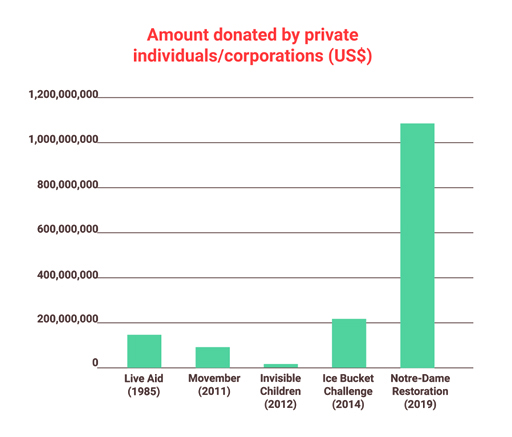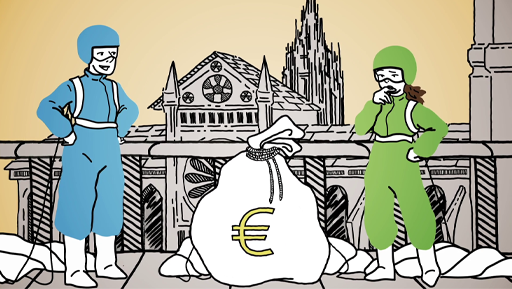1.4 Charitable donations to the restoration project
As noted in Section 1.3, over €1 billion of public donations were pledged for Notre-Dame’s restoration. This figure did not exceed the equivalent amount of donations collected for massive humanitarian catastrophes such as Hurricane Katrina in 2005 (US$4.65 billion raised), the Haitian earthquake in 2010 (US$3.75 billion raised), or the Indian Ocean tsunami in 2014 (US$3.1 billion raised).
However, the money offered by private individuals and corporations to help rebuild Notre-Dame did greatly outweigh offerings for many other globally publicised charity appeals, as Figure 9 shows.

These other examples of global charity appeals were all aimed at relieving human suffering in some way, through tackling famine or child exploitation, or funding medical research and awareness. Despite this, they did not attract as much public support (in the form of financial giving) as the repair and restoration of a cathedral.
Many commentators saw this as unacceptable, revealing a serious moral flaw in our society. Although individuals had donated money to a good cause, the higher degree of concern shown for Notre-Dame compared with other causes was seen by many people as evidence of a failure to properly empathise with the plight of human beings in need.
One common argumentative strategy used here was to point out the kind of benefits that the money pledged to Notre-Dame could have delivered had it been donated to other charities. It was said that €1 billion could have been used to better effect had it been more thoughtfully given.
The animation in the activity below recaps the situation we find ourselves in. It also outlines some specific alternative uses of the funds, showing just how far the money could go.
Activity 3 The ethics of charitable donations
Watch the following video comparing the value of donations to Notre-Dame’s restoration to other charitable causes. Afterwards, complete the rest of the activity below.

Transcript
Discussion
You may agree that there are better uses of our money than restoring the cathedral. However, even if that is true, you might still think it’s morally okay or even praiseworthy to donate money to Notre-Dame. These questions are centred on a complex ethical problem which it is difficult to solve. We need to think about the worth of heritage, but also what freedoms people have to spend their money, and what kind of moral standards we can hold each other to.
As you have seen, some people criticised the level of donations received by Notre-Dame. Their general motivation for doing so was outlined above. In the following sections you will see some more concrete arguments they might make, and possible defences or responses to those arguments.
